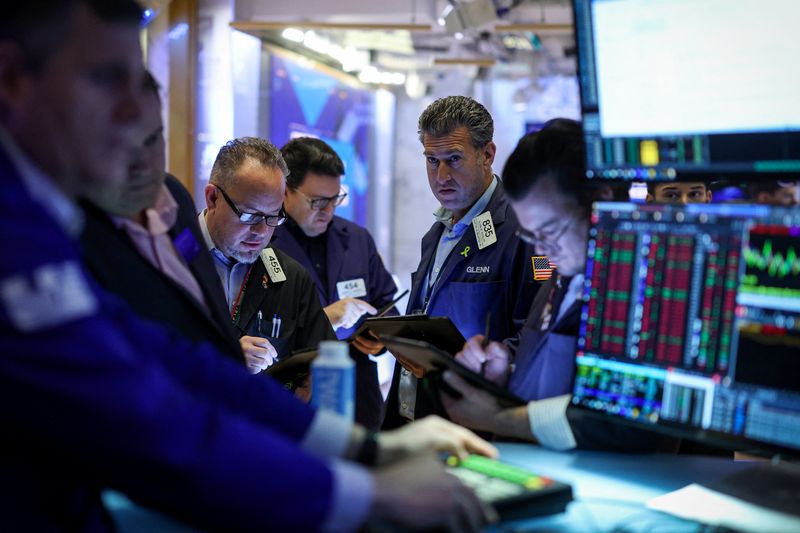By Chuck Mikolajczak
NEW YORK (Reuters) -Global stocks rallied on Friday but remained on track for a weekly decline, while the dollar stalled after its recent rally but found some support from a stronger-than-expected U.S. manufacturing survey.
U.S. stocks secured strong gains, with both the S&P 500 and Nasdaq up more than 1% to snap a five-session streak of declines, their longest since mid-April. All 11 major S&P sectors rose, led by a 2.42% jump in consumer discretionary stocks.
The U.S. currency rallied late last year as investors bet President-elect Donald Trump's policies would drive growth and inflation, meaning fewer interest rate cuts ahead from the Federal Reserve and higher U.S. Treasury yields, while European central banks are set to keep cutting rates.
The Fed's December policy statement led investors to reduce expectations for the number and size of cuts from the central bank in 2025.
"The nice thing about today's attempt is that it's kind of persisting into the afternoon even though yields are a couple basis points higher across the curve so it's not like it's coming from just relief on the Treasury yield front that could be reversed next week," said Ross Mayfield, investment strategist at Baird in Louisville, Kentucky.
"A lot of this weakness over this month has been related to higher yields and a higher dollar so it's nice to see the kind of follow through today even on a day where yields are kind of holding firm."
The Dow Jones Industrial Average rose 339.86 points, or 0.80%, to 42,732.13, the S&P 500 rose 73.92 points, or 1.26%, to 5,942.47 and the Nasdaq Composite rose 340.88 points, or 1.77%, to 19,621.68.
For the week, the S&P 500 shed 0.48%, the Nasdaq fell 0.51% and the Dow lost 0.6%.
MSCI's gauge of stocks across the globe advanced 7.52 points, or 0.90%, to 847.45 - on track for its biggest daily percentage gain since Nov. 7 - but still poised for its third weekly decline in the past four.
In Europe, equities closed lower, with the pan-European STOXX 600 index down 0.49%, weighed by luxury companies and alcohol providers, but able to record a second straight weekly gain.
Trading volume was light at the end of a holiday-shortened week.
The dollar index, which measures the greenback against a basket of currencies, fell 0.29% to 108.90 after briefly paring losses as the Institute for Supply Management (ISM) said a key manufacturing index increased more than expected to 49.3 last month, the highest reading since March, from 48.4 in November.
The greenback was poised for its fifth straight week of gains, having hit a two-year high of 109.54 in the prior session.
The euro was up 0.43% at $1.0309 but set for its fifth straight weekly loss and its largest weekly percentage drop since mid-November.
Against the Japanese yen, the dollar weakened 0.15% to 157.29 while the British pound strengthened 0.36% to $1.2424.
The yield on benchmark U.S. 10-year notes was up 2.7 basis points at 4.602%, also paring declines after the manufacturing data. The yield remained above the 4.5% mark that has proven problematic for equities after reaching an eight-month high of 4.641% earlier this week.

Richmond Federal Reserve bank president Tom Barkin said the central bank's benchmark policy rate should stay restrictive until it is more certain that inflation is returning to the Fed's 2% target.
U.S. crude jumped 1.13% to settle at $73.96 a barrel and Brent settled up 0.76% to $76.51 per barrel, buttressed by colder European and U.S. weather and additional economic stimulus announced by China.
